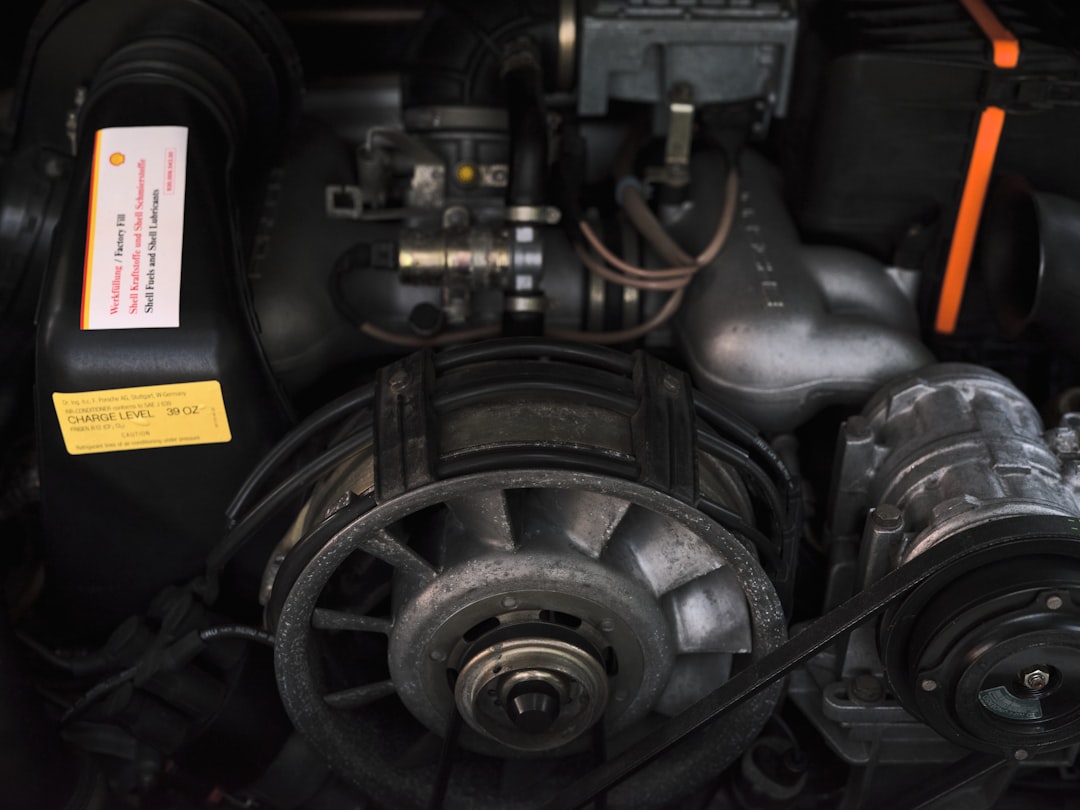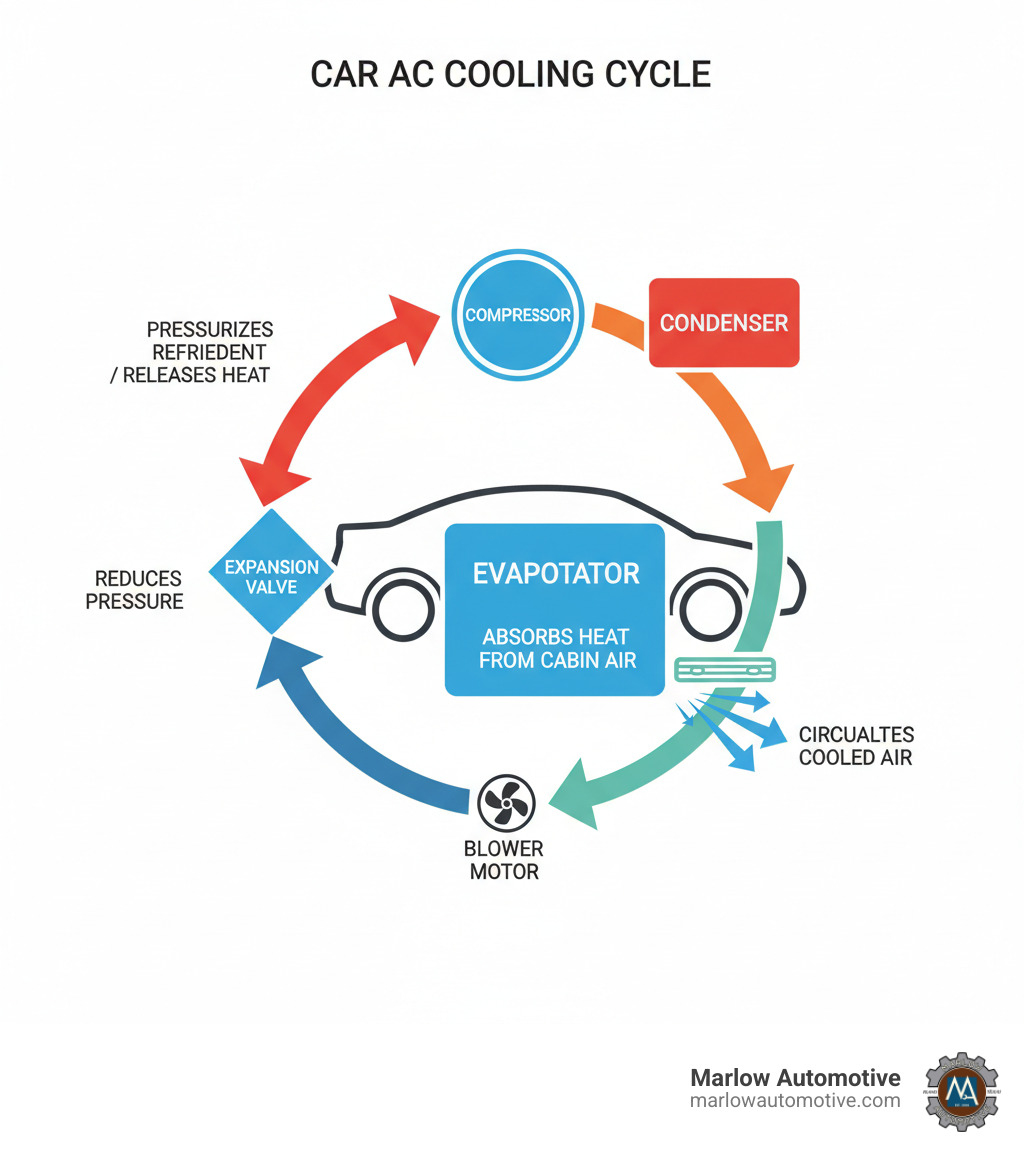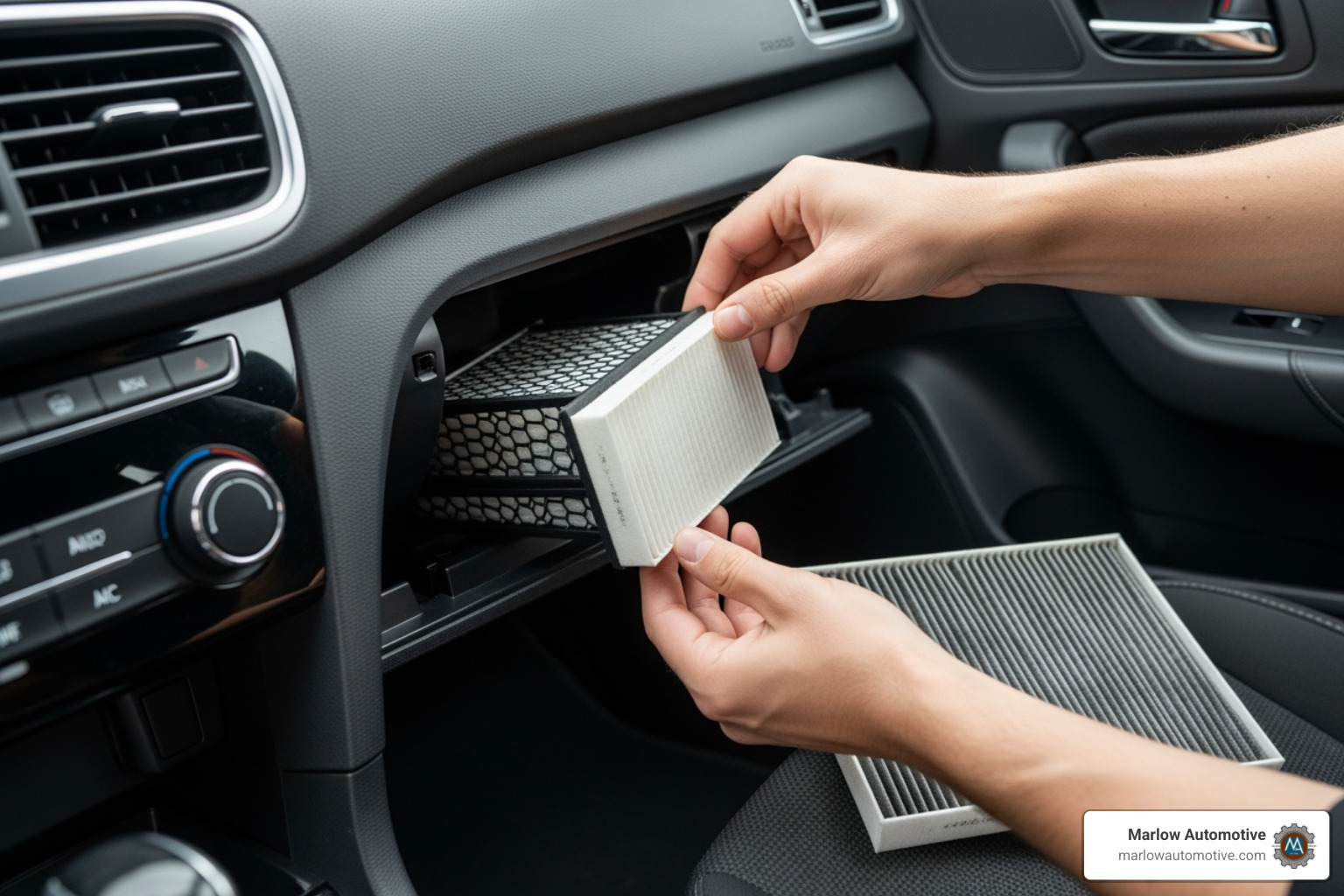Diagnosing Your Car's AC: What to Check Before You Repair

Why Car AC Maintenance Matters More Than You Think
Car ac maintenance is about more than staying comfortable in the Texas heat; it's about protecting your wallet and your vehicle. When your AC fails on a 100-degree day in Plano, you'll know that cold air is a necessity, not a luxury.
Essential Car AC Maintenance Checklist:
- Replace cabin air filter every 15,000-30,000 miles
- Check refrigerant levels every 1-2 years
- Inspect for leaks around hoses and connections
- Clean condenser fins of debris and bugs
- Run AC weekly even in winter to maintain seals
- Professional service annually to catch problems early
Many car owners wait for a failure to think about maintenance. However, a simple $20 cabin air filter replacement can improve gas mileage by up to 10% and help prevent a $1,500 compressor failure.
Your car's AC is a complex, sealed system. When one part fails, it can cause a domino effect leading to more expensive repairs. The good news is that most AC problems provide warning signs long before a total breakdown.
Knowing what to check and when to call a professional can save you hundreds and keep you cool. This guide will walk you through DIY diagnostics and help you recognize when to trust the experts.

Telltale Signs Your Car's AC Needs Attention
Your car gives you warning signs before the AC fails. Learning to spot these signs for car ac maintenance can save you from expensive repairs and uncomfortable drives in Plano traffic. The good news? Your car gives you plenty of warning before things go completely sideways.

Weak Airflow
If the airflow from your vents is weak, it often points to a clogged cabin air filter—an easy fix. It could also mean a failing blower motor or a blockage in the system, both of which make your AC work harder and waste fuel.
Lukewarm Air
There's nothing like turning on your AC on a scorching day and getting lukewarm air. This usually means your refrigerant is low. Since refrigerant is in a sealed system, low levels indicate a leak that needs to be fixed. Simply adding more refrigerant is a temporary solution that doesn't address the root problem.
Strange Noises
Your AC should be quiet. Pay attention to new noises:
- Grinding can signal a failing compressor—the heart of your AC system.
- Squealing often points to a worn serpentine belt that drives the compressor.
- Rattling could mean loose parts or debris in the blower motor.
- Hissing after turning off the engine often indicates a refrigerant leak.
Musty or Sweet Smells
Your nose is a great diagnostic tool. A musty, sock-drawer smell suggests mold or mildew on the evaporator coil. A sweet, maple syrup-like smell is more serious, indicating an antifreeze leak from your heater core that requires immediate professional attention.
Visible Fluid Leaks
While a small puddle of water under your car is normal condensation, water dripping inside the cabin means a clogged AC drain line. This can lead to mold and electrical damage. Also, look for oily residue around AC components, which is a telltale sign of a refrigerant leak.
AC Clutch Not Engaging
Listen for a "click" when you turn on the AC; that's your compressor clutch engaging. If there's no click, or it clicks on and off rapidly, you could have low refrigerant, an electrical issue, or a failing clutch. Paying attention to these signs can save you from emergency repairs.
How Your Car's Air Conditioning System Works
Ever wonder how your car transforms scorching Texas heat into refreshing cool air? It's not magic, but a fascinating heat exchange process. Your car's AC is a closed-loop system that works like a refrigerator on wheels, using a special fluid called refrigerant to move heat from inside your cabin to the outdoors. For a broader overview of how these systems work, see automobile air conditioning.
The refrigerant continuously changes from a liquid to a gas and back again, absorbing heat from your cabin and releasing it outside. This complex dance of physics happens reliably, even when it's 105 degrees in Plano. For comprehensive information about keeping your entire cooling system in top shape, visit our cooling system services page.
The Basic Components and Their Roles
Proper car AC maintenance depends on understanding how each component works together. Let's break down the key players:
The compressor is the heart of the system, pressurizing the refrigerant from a low-pressure gas to a high-pressure one. Noises like grinding or squealing mean it needs attention. For issues, our team offers expert compressor repair in Plano, TX.
The condenser, located near your radiator, cools the hot, high-pressure gas from the compressor, turning it back into a liquid. This process releases the heat absorbed from your cabin into the outside air.
The receiver-drier filters moisture and contaminants from the refrigerant, protecting the system from corrosion and blockages.
The expansion valve causes a sudden pressure drop, which rapidly cools the refrigerant as it turns into a low-pressure gas before entering the evaporator.
The evaporator, located in your dashboard, absorbs heat from the cabin air. As the blower motor pushes air over its cold fins, the air cools down and is dehumidified.
The blower motor circulates the newly cooled air through your vents and into the cabin.
Refrigerant is the cooling agent, typically R-134a or the newer R-1234yf. It doesn't get "used up," so if your levels are low, it means there's a leak that needs to be fixed before a recharge will be effective.
Essential DIY Car AC Maintenance Checks
You don't have to be a mechanic to perform basic car ac maintenance. These simple checks can keep your system running efficiently, save you money, and prevent a breakdown in the Texas heat.

Inspect and Replace Your Cabin Air Filter
Your cabin air filter protects you from dust, pollen, and exhaust fumes. It's usually located behind the glove box; check your owner's manual for the exact location.
A clogged filter restricts airflow, forcing your AC to work harder and causing reduced airflow or musty smells. Replace it every 15,000 to 30,000 miles, or more often in dusty areas. A clean filter can improve your gas mileage by up to 10% because the system runs more efficiently.
A clean filter also provides significant health benefits by improving air quality inside your car, which is especially important for those with allergies or asthma. For help with this and other routine tasks, check out our auto maintenance services.
Perform Visual Inspections and Basic Cleaning
A quick visual inspection can catch problems early. Start by checking your condenser fins at the front of the car. Gently clean away leaves, bugs, and road grime with a soft brush or a light spray from a hose, being careful not to bend the delicate fins.
With the engine off and cool, inspect your belts and hoses. Look for cracks in the serpentine belt or hoses that appear swollen or brittle. Also, look for oily residue around AC components, as this indicates a refrigerant leak.
Finally, ensure your AC drain line isn't clogged. If you notice water dripping inside the car instead of underneath it, the line needs to be cleared.
Seasonal Car AC Maintenance Tips
Your AC needs attention year-round, not just in summer. Winter maintenance is crucial for preventing leaks. Run your defrost mode for about 10 minutes weekly, even in cold weather. This circulates refrigerant and oil, keeping seals lubricated to prevent them from drying out and cracking.
For summer preparation, open your windows for a minute before turning on the AC to let hot air escape. This reduces the initial load on the system. A professional pre-season check can catch small issues before they become major problems in the July heat.
Common AC Problems and When to Call a Professional
While DIY checks are helpful, some car ac maintenance problems require professional tools and expertise. Trying to fix complex AC issues yourself can often make things worse.
Refrigerant leaks are the most common problem we see. Refrigerant doesn't get "used up"; if it's low, there's a leak. Simply adding more is a temporary fix that wastes money and can damage your system.
Compressor failure is another major issue. The compressor is a complex component, and problems like grinding noises or failure to engage require professional diagnosis.
Electrical issues involving fuses, relays, and sensors can be tricky to diagnose without specialized equipment. Our team offers comprehensive auto electrical services to solve these problems.
The key is knowing when to call a professional. We identify the root cause to ensure the problem doesn't return.
The Importance of Regular Car AC Maintenance
Ignoring AC maintenance affects more than just your comfort; it costs you money. A struggling AC system makes your engine work harder, reducing fuel efficiency. The extra load can also cause increased engine strain, potentially leading to overheating.
Ignoring small problems leads to expensive repairs. A minor refrigerant leak can starve the compressor of oil, leading to its failure—turning a small repair into a $1,500+ job. This can cause a component failure cascade, where one failing part damages others, resulting in a complete system overhaul. If you notice engine issues related to AC use, our engine repair specialists can help.
Diagnosing Common Failures and Repair Costs
Refrigerant leaks are the top issue, occurring at seals, hoses, or from damage to the condenser. Repairing them requires specialized equipment to recover old refrigerant, replace the faulty part, and properly recharge the system according to EPA regulations.
Compressor malfunctions often present as grinding or squealing noises. Running a compressor with low refrigerant is like running an engine without oil and will cause severe damage.
Cooling fan defects can cause the AC to blow warm air in traffic but work fine at highway speeds, as the system isn't getting enough airflow over the condenser.
Repair costs vary. A simple fix like an O-ring might be $150-$300, while major component replacements like a compressor can exceed $1,000-$2,000. Accurate diagnosis is key to avoiding unnecessary costs. We use advanced computer diagnostics to pinpoint problems accurately, saving you money by fixing the right part the first time.
Choosing a Qualified AC Repair Shop
Choosing the right shop for AC work is critical, as it's a specialized field. Look for:
- ASE-certified technicians with HVAC specialization.
- A shop with experience diagnosing subtle AC issues.
- A commitment to using quality parts that last.
- A solid warranty on repairs, like our 2-year/24,000-mile warranty.
- A policy of providing a detailed estimate before work begins.
- Positive customer reviews that speak to quality and service.
Frequently Asked Questions about Car AC Service
We get a lot of questions about car ac maintenance at Marlow Automotive. Here are answers to the most common ones.
How often should I have my car's AC system serviced?
Even if it's working fine, we recommend a professional service every 1-2 years. This allows us to check for leaks, test pressures, and catch small problems before they become expensive repairs, ultimately extending your system's life.
What is an AC recharge and do I need one?
An AC recharge adds refrigerant to your system. However, since modern AC systems are sealed, needing a recharge means you have a leak. Simply adding refrigerant is a temporary fix; the leak must be found and repaired first. Running the system with low refrigerant can also damage the compressor. We always diagnose and repair leaks before recharging the system to provide a long-term solution.
How much does it typically cost to repair a car's AC?
AC repair costs vary widely. A minor fix like an O-ring replacement might be $150-$300. Major component failures, like your compressor, can cost $1,000 to $2,000 or more. Regular car ac maintenance is the best way to avoid these large repair bills. At Marlow Automotive, we provide detailed estimates before any work begins, and our 2-year/24,000-mile warranty provides peace of mind.
Stay Cool with Expert AC Service

Understanding your car's AC is the first step to avoiding costly repairs. As we've covered, proactive car ac maintenance is always better than reactive repairs. Simple steps, like checking your cabin air filter or running the defrost in winter, can prevent a $1,500 compressor replacement or expensive leaks.
Don't wait for a breakdown. Warning signs like weak airflow, strange noises, or musty smells are your car's way of asking for help before things get expensive.
At Marlow Automotive, our ASE-certified technicians help drivers in Plano, Texas stay cool. We know your AC affects safety, fuel efficiency, and peace of mind. We use top-quality parts and maintain constant communication during repairs.
Our commitment is to provide quality that exceeds dealerships with a local touch. Every AC repair is backed by our 2-year/24,000-mile warranty. From a simple leak fix to a full compressor replacement, we get it right the first time.
Ready to beat the Texas heat? Schedule your auto AC repair in Plano, TX with us today. Your future self will thank you when you're cruising comfortably while others are sweating at red lights.
Customer Testimonials
Service Areas








